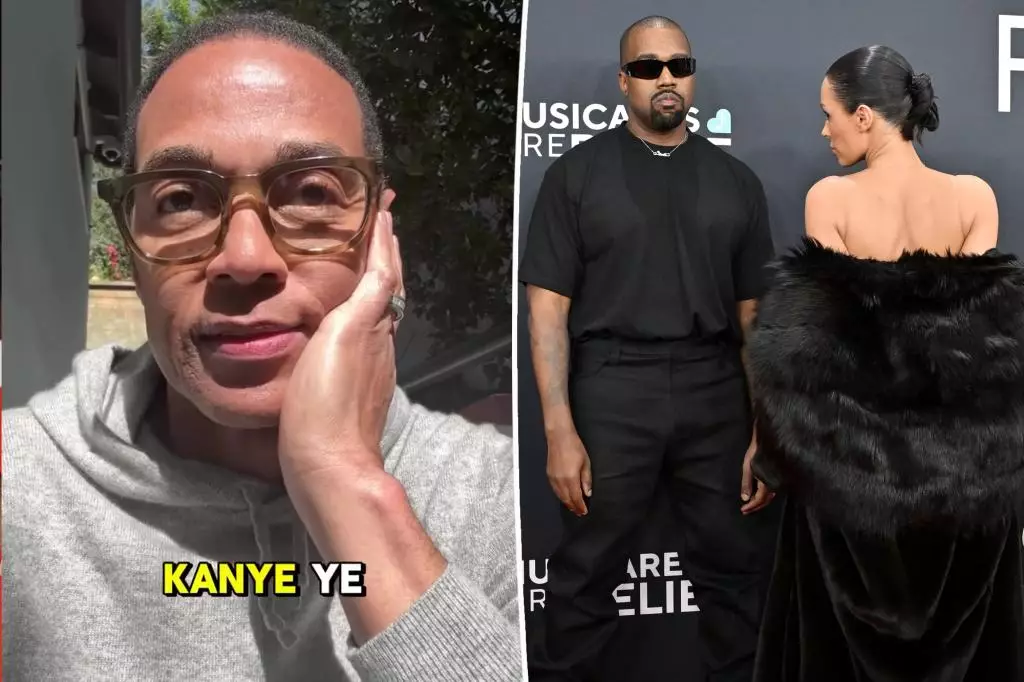In a world where celebrity conflicts often overshadow more pressing societal issues, the spat between CNN anchorman Don Lemon and rapper Kanye West has stirred considerable conversation. The incident in question highlights not only the dynamics of celebrity interactions but also brings to the forefront issues of race and respect within the African American community.
The confrontation ignited when Kanye West, the frequently controversial figure in modern music, labeled Lemon a “koon” on social media. This derogatory term has historically been used within the Black community as a pejorative against those perceived to behave in a way that undermines their own race. Lemon expressed his disappointment and frustration, noting that as two Black men, there should be a level of mutual respect. He recounted the episode while attending the 14th Annual NFL Honors in New Orleans, emphasizing that such language creates unnecessary division.
Lemon was not the source of the rumor about West and his wife, Bianca Censori, being ejected from the Grammy Awards ceremony. Instead, he aimed to relay information that had come to his attention, making it clear that he did not witness the incident firsthand. Yet the cascading effects of social media miscommunication often see narratives morph quickly into accusations, leading to Lemon’s denouncement of West’s claims.
The incident showcases the precarious nature of media representation, particularly when public figures are involved. Lemon openly shared that much of what circulated was secondhand information rather than direct observation. He illustrated this dynamic well when describing his own experience trying to interview West, who was uncooperative and seemingly preoccupied during their interaction. It’s telling how celebrity behavior and response can feed back into larger media narratives, sometimes with little regard for factual accuracy.
Kanye West’s response on Instagram, accusing Lemon of being a perpetuator of damaging rumors, is emblematic of a larger issue within celebrity culture. In a world where personal and professional reputations can be made or shattered at the speed of a tweet, miscommunication can lead to real conflict. West’s public condemnation of Lemon shifted the focus from the real issue— the appropriateness of their exchanged words— to a personal vendetta that many fans and spectators found troubling.
The Red Carpet Stunt and Its Implications
Adding to the drama was the couple’s striking appearance at the Grammys, particularly Censori’s daring outfit choice. While Lemon recognized that Kanye has a reputation for being a “master marketer” and promoter, he expressed surprise over the extent of the visual spectacle, especially the revealing nature of Censori’s attire. This stunt, which some insiders suggested was an attempt to emulate Kanye’s upcoming album cover artwork, speaks volumes about the lengths to which public figures will go to garner attention.
The timing is crucial here; the Grammy Awards often act as a cultural bellwether, and as such, celebrity antics— while side shows— can still mask serious discussions about artistic integrity and the commercialization of the very essence of music culture. In many ways, this spectacle diminishes the artistic achievements celebrated during the event, leading to questions about authenticity versus publicity.
The exchange between Lemon and West ultimately showcases the complex, often fraught intersections of race, media representation, and personal integrity. As public figures wield substantial influence, the words they choose can reverberate far beyond their immediate context. It is essential to cultivate dialogue that surpasses derogatory terms and accusations and embrace respect and understanding, especially within communities that have faced historical oppression.
In the 21st-century media landscape, where social media amplifies every remark, both celebrities and their audiences must strive for a deeper comprehension of the implications of their words. Lemon’s plea for respect from West hints at a broader craving for unity in a time when divisiveness runs rampant, underscoring that even in moments of conflict, a more nuanced, respectful dialogue is both possible and necessary.
